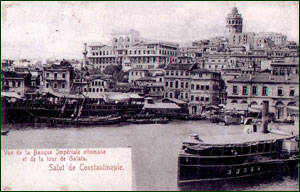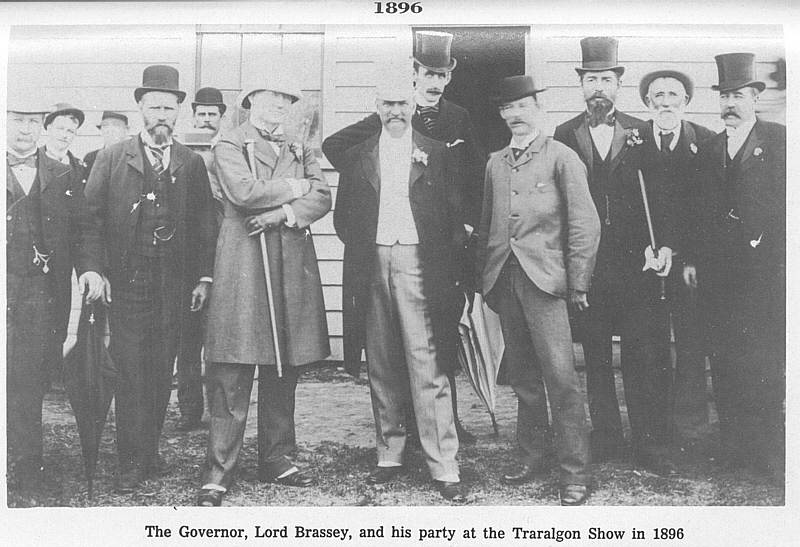 |
|
|
Constantinople Massacre August 26-27, 1896: |
|
This short articles outlines the seizure of the Imperial Ottoman Bank by the Armenian Dashnaktsutiun (or Dashnaks) in August 1896 to draw the attention of the Great European powers of the failure of Sultan Abdul II to implement administrative reforms in the Eastern Vilayets of the Ottoman Empire. The slaughter of Armenians that followed in Constantinople was discussed by the Presbyterian Church in Colonial Victoria (Australia). As it will be seen, the actions of the Dashnaks and massacre that followed in Constantinople certainly drew the attention and ire of the Church. |
|
|
On August 26, 1896 Armenian Dashnaks seized the Imperial Ottoman Bank (a Franco-British establishment) in Constantinople, threatening to blow it up, if reforms were not implemented in the Eastern Vilayets of the Ottoman Empire. The Dashnaks, also known as the Armenian Revolutionary Federation, was established in Tiflis in 1890 whose initial aim was “the administrative and economic freedom of Turkish Armenia.” |
 |
|
The Dashnaks were unhappy with the resignation of Patriarch Matteos Ismirlian claiming that he was forced to resign and that the Sultan appointed locum tenens Bartolomeos whom the revolutionaries considered a stooge of the Court. In fact, the selection of a Patriarch was based on a mixed Council composed of lay and clerical members who belonged to the Armenian National Assembly. This election process was recognised by the Porte. It appears that Sultan Abdul Hamid bypassed this Armenian political institution. The Dashnaks accused the Ottoman Government of having committed a series of unpunished crimes and equally the inaction of the European powers made them accomplices of the Porte. They cited that “In Crete, as in Armenia, they receive the demands of the Christians with the same disdain of our executioners. But the patience of down-trodden nations has its limits.” |
|
Their aim was to draw the attention of the European powers to take action on behalf of the suffering Armenian people. Some of their demands, signed by the "Central Committee of the Society of Armenian Revolutionists called Dashnaks," included:
The European powers entrusted the first dragoman (interpreter) of the Russian Embassy, Maximov, to bargain with the Dashnaks. They left Constantinople by French steamer for Marseilles. After their departure from Constantinople, a horrible massacre was carried out on the Armenian population in that city by mobs of ruffians, police and soldiers with the connivance of the Ottoman Government.
The Churches and politicians in Colonial Victoria: the Ottoman Bank issue
The Churches in Victoria reacted with horror to the slaughter of Armenians in Constantinople in the aftermath of the Ottoman Bank crisis. The Rev. P. J. Murdoch (Victoria) told the Federal Assembly of the Presbyterian Church that he was horrified at the persecution and massacre of Armenians in Constantinople and understood the difficulty of the British government in seeking a diplomatic solution to the Armenian issue. He described Abdul Hamid as an “assassin” who permitted such slaughter of Christians to take place in his empire. Murdoch advocated that a memorial be forwarded to Queen Victoria through the office of the Governor of Victoria. The motion was approved by the Federal Council and great care had been exercised with the choice of words sent to the regent. On September 15, 1896 the Presbyterian Church, at its Federal Assembly held in Melbourne, sent a memorial to Queen Victoria expressing its indignation over the recent massacre that occurred in Constantinople. It was important for the Presbyterian churches in the Australian colonies to unite and speak with one voice on this very important matter.The memorial is reproduced below in full. It stated:
|
|
|
On a Vice Regal visit to Wimmera, a country town in Victoria, Governor Lord Brassey mentioned that on the previous day the Federal Presbyterian Church had presented him with a resolution “demanding that the Imperial Government should do all in its power, and exercise all authority at its command, for the protection of the unfortunate Christians of the Turkish empire.”
He sympathised with the position of the Presbyterian Church and believed that the Ottoman Empire was on verge of dissolution. However the “unfortunate jealousies of the European Powers” had saved it from crumbling. |
|
|
|
|
|
(Posting date 2 October 2006) About Author Stavridis Stavros Terry Stavridis was born in Cairo, Egypt in 1949 of Greek parents. He migrated to Australia with his parents in September 1952. Stavros has a Bachelor of Arts (B.A) in Political Science/Economic History and B.A (Hons) in European History from Deakin University and M.A in Greek/Australian History from RMIT University. His MA thesis is titled "The Greek-Turkish War 1919-23: an Australian Press Perspective." Stavros has nearly 20 years of teaching experience, lecturing at University and TAFE (Technical and Further Education, the equivalent of Community College in the US) levels. He has presented papers at international conferences in Australia and USA and has also given public lectures both in Australia and on the West Coast of the US. Many of his articles have appeared in the Greek-American press. He currently works as a historical researcher at the National Center for Hellenic Studies and Research, Latrobe University, Bundoora, Victoria, Australia. Stavros' research interests are the Asia Minor campaign and disaster, Middle Eastern history, the Assyrian and Armenian genocides, Greece in the Balkan Wars 1912-13 and the First World War and history in general. HCS maintains a large selection of fine pieces written by Mr. Stavridis which viewers are invited to view at the URL http://www.helleniccomserve.com/stavridisone.html About Author Kateb Mr Kateb is the Director of the Armenian Language Program on Special Broadcasting Service (SBS) Radio in Melbourne, Australia. He has completed a Masters dissertation titled "Australian Press Coverage of the Armenian Genocide 1915-1923" at University of Wollongong in 2003. Read More About the Greeks of Asia Minor HCS readers who enjoyed this article may wish to view others about Smyrna and Asia Minor in our section specially created for these topics at the URL http://www.helleniccomserve.com/smyrnaopener.html. We also maintain a permanent, extensive archives of articles which readers are invited to browse at the URL http://www.helleniccomserve.com/archivesmyrnaasiaminor.html . |
|
|
|
|
2000 © Hellenic Communication Service, L.L.C. All Rights Reserved.
http://www.HellenicComServe.com |
|

